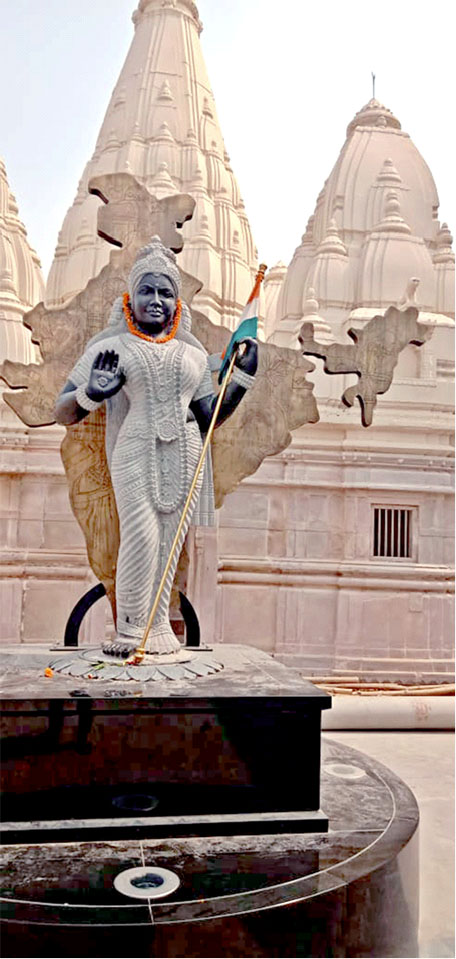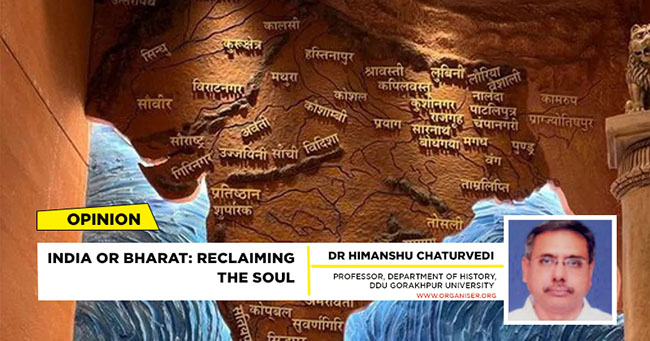A nation with a history of civilisation, which dates back to thousands of years, is in the midst of a controversy over its name in the 21st century. It is just not a trivial issue over name and controversial argument does have a root of certain intellectual trajectory in post-colonial Bharat borrowing a thought process from colonial days. Let us say, in simple words, shall we be influenced by ‘endonym’ or by ‘exonym’. Need not to emphasise that a name affixed to an identity by its own community is bracketed as ‘endonym’, whereas a name so affixed by an outsider is ‘exonym’. Tracing the history of ‘self’ which is almost synonymous to the cultural roots of nomenclature dating back to Vishnu Puran, that accords a sense of nationhood to a geographical territory: Uttaram yat samudrasya himadrescaiva dakshinam/ Varsham tad bharatam nama Bharti yatra santatih (The land lying north of the ocean and south of the snow covered mountains is called Bharata). This is the ‘endonym’ name associated with the territory of the nation since earliest times. On the contrary, according to a certain section of intelligentsia which goes back to the days of Alexander, Megasthenese and so many outsiders to claim that the name ‘India’ exists in history since then. However, one has to decide the homogeneity of such intruders/visitors on the scale of ‘exonym’.
Bharatiyata under Siege
Not going far back, one can trace the origin of the issue in the 19th century Bharat. It is interesting to note that many scholars of modern Indian history prolifically judged the emergence of ‘modern India’ in the course of the 19th century. If modern India was emerging then the colonial rule was a God sent opportunity to enlighten Bharat through a mixture of Evangelical and Utilitarian thought process. Perhaps these scholars of certain leanings failed to look deep into the process of intangible destruction that emerging modern India through colonial tools was witnessing in the form of colonising the native minds. It is interesting to note that earlier colonists referred Bharat as ‘Indoostan’ and termed Hindu jurisprudence as ‘Code of Gentoo Laws’. Further, the intangible destruction of the culture reached its zenith when Macaulay declared that ‘no Indian literature is worth keeping in a shelf of European library’. It was not merely a rejection of literature but succinctly the rejection of a civilisation’s treasure on which a culture thrives. Hence on, ‘Bharat started contesting modern India’ a theme so dearly avoided by a section of scholars in post colonial Bharat. One cannot avoid mentioning that the basic fundamentals of Bharat were put under the denomination of ‘satanic’ and ‘snake charmers’. In a nutshell, condemnation of Bharatiya ethos was the story of 19th century emerging modern India. It was then, Bharat again started contesting to preserve its soul, as it has done previously also many times.
Intangible destruction of culture reached its zenith when Macaulay declared that ‘no Indian literature is worth keeping in a shelf of European library’
Contesting Bharat
If modernity wrought through colonialism is a denomination of compromising the identity of ‘self’, basically ‘Swa’, then world history is full of such examples. Comprehending the contestation of Bharat with India is an unparalleled history. Classical example of loss and recovery of the self during such struggle is the story of Aurobindo Ghosh. It is impossible to read the life of Aurobindo without sensing the ‘inner’ pain which went in imperialism in India. Much of the pain was inflicted and much of the destruction of his cultural self undertaken within the confines of his family, popularly known as ‘Bhadralok’ of earliest Western education by-product of Macaulay’s Bengal. It was a total system which young Aurobindo had to confront. For years he was taught to view England as an ideal society and Aurobindo Ackroyd Ghose- the Western middle name was given by his father at birth. To understand the wrath of cultural penetration of colonialism one needs to trace the journey of Aurobindo Ackroyd Ghose to Aurobindo Ghose and finally to Sri Aurobindo. This may shed light on the cultural invasion of colonial philosophy and the Bharatiya response by understanding the ‘loss and recovery of self’ through Aurobindo and through him the recovery of fundamental ideals of Bharatiyata. Thus, his observations are clear-‘I know my country as a mother. I offer my devotions my worship’. . His philosophy, which inspired a generation of nationalists, through ‘Bhavani Mandir’ speaks volumes about ‘Nation’- as for him-. ‘ For What is a Nation? What is our Mother Country? It is not a piece of art nor a figure of speech, nor a fiction of mind, it is a mighty Sakti composed of all the Saktis of all the millions of units, that make up of the nation just as Bhavani Mahisha Mardini sprang into being from the Saktis of all million of Gods assembled in our mass of force and wielded into unity of the Saktis of 300 million people’. Thus, spiritualism, an adverse idea of nationalism to occidentals, became a principal characteristic of his political philosophy- perhaps an answer to the West and its ethos which influenced so many that Bharat may have been lost forever in the emergence of modern India. Later, the mantra of three ‘Swa’ i.e. ‘Swa+ Raj’, ‘Swa+Desh’ and devotion to ‘Motherland’ (‘Vandematram’) became the fundamental principle of nationalist saga for the majority. All three traced the lineage of Bharat finally culminating in the words of Tagore- ‘Bharat Bhagya Vidhata’.

Contestation Continues
India was freed in 1947, historically the emergence of Bharat would have been a natural culmination as nomenclature. Colonialists did have native collaborators, but unfortunately colonialism had a deeper influence on few newly politically independent Indians. That amounts to the net success of a colonial power. It is interesting to summarise that the debate on the nomenclature was initiated in the Constituent Assembly on November 4, 1948, when draft of Constitution was put forth, immediate reaction was on the name of omission of ‘Bharat’. A year later, on September 18th, 1949, the amendment did consist as- ‘India that is Bharat shall be a Union of States’. To this, HV Kamath said this was a clumsy construction and a constitutional slip. Kamath cited the example of Ireland: ‘The name of the State is Eire, or in the English language, Ireland. He wanted to specify ‘in the English language’-the name. Other than Kamath, it is worth quoting another member, Seth Govind Das, who said that the word India does not occur in our ancient books. It began to be used when the Greeks came to India. They named our Sindhu river as Indus and India was derived from Indus. There is a mention of this in Encyclopaedia Britannica. On the contrary, if we look up the Vedas, the Upanishads the Brahmanas and our great and ancient book the Mahabharat, we find a mention of the name Bharat. But Macaulay had rejected them all in 1835.
If modernity wrought through colonialism is a denomination of compromising the identity of ‘self’, basically ‘Swa’, then world history is full of such examples
A relevant portion of the debate in the Constituent Assembly may suffice the issue of contesting Bharat in the now emerged modern India. Shri Kamla Pati Tripathi said on the amendment of Kamath that, ‘When a country is in bondage, it loses its soul. During its slavery for one thousand years, our country too lost its everything. We lost our culture, we lost our history, we lost our prestige, we lost our humanity, we lost our self respect, we lost our soul and indeed we lost our form and name.’ Today after remaining in bondage for a thousand years, this free country will regain its name and we do hope that after regaining its lost name it will regain its inner consciousness and external form and will begin to act under the inspiration of its soul which had been so far in a sort of sleep. it will indeed regain its prestige in the world. The revolutionary movement that took place in the country by following the footsteps of Bapu, the Father of the Nation, made us recognise our form and our lost soul. Today it is due to him alone and due to his penance that we are regaining our name too. Sir, I am enamoured of the historic name of Bharat. Thus, Bharat somehow managed to sneak in on terms ‘India that is Bharat’. So the nomenclature is not just a trivial issue, as Bharat is still contesting due to exonym.




















Comments